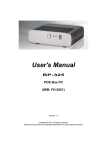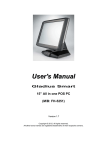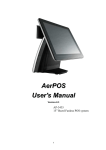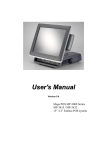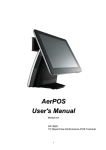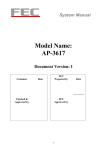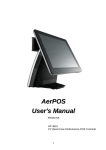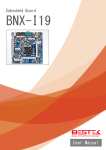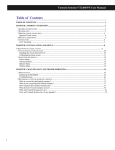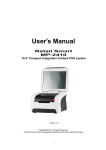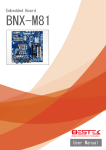Download 2 - Hant
Transcript
User's Manual RT-665D 15” All in one POS PC (M/B: FH-5251) Version 1.7 Copyright © 2012. All rights reserved. All other brand names are registered trademarks of their respective owners. 1 Copyright Notice This document is copyrighted, © 2012 All rights are reserved. Firich Enterprise Co., Ltd reserves the right to make improvements of the product described in this manual at any time without notice. No part of this manual may be reproduced, copied, translated, or transmitted in any form or by any means without the prior written permission from Firich Enterprise Co., Ltd. Information provided in this manual is intended to be accurate and reliable. However, Firich Enterprise Co., Ltd assumes no responsibility for its use, nor for any infringements upon the rights of third parties, which may result from its use. The material in this document is for product information only and is subject to change without notice. While reasonable efforts have been made in the preparation of this document to assure its accuracy, Firich Enterprise Co., Ltd, assumes no liabilities resulting from errors or omissions in this document, or from the use of the information contained herein. Safety and Warranty 1. Read these safety instructions carefully. 2. Keep this user manual for later reference. 3. Disconnect this equipment from any AC outlet before cleaning. Do not use liquid or spray detergents for cleaning. Use a damp cloth. 4. For pluggable equipment, the power outlet must be installed near the equipment and must be easily accessible. 5. Keep this equipment away from humidity. 6. Put this equipment on a reliable surface during installation. Dropping it or letting it fall could cause damage. 7. The openings on the enclosure are for air convection. Protect the equipment from overheating. DO NOT COVER THE OPENINGS. 8. Make sure the voltage of the power source is correct before connecting the equipment to the power outlet. 9. Position the power cord so that people cannot step on it. Do not place anything over the power cord. 10. All cautions and warnings on the equipment should be noted. 11. If the equipment is not used for a long time, disconnect it from the power source to avoid damage by transient over-voltage. 12. Never pour any liquid into an opening. This could cause fire or electrical shock. 13. Never open the equipment. For safety reasons, only qualified service personnel should open the equipment. 14. If any of the following situations arises, get the equipment checked by service personnel: a. The power cord or plug is damaged. b. Liquid has penetrated into the equipment. c. The equipment has been exposed to moisture. d. The equipment does not work well, or you cannot get it to work according to the user’s manual. e. The equipment has been dropped and damaged. f. The equipment has obvious signs of breakage. 15. DO NOT LEAVE THIS EQUIPMENT IN AN UNCONTROLLED ENVIRONMENT WHERE THE STORAGE TEMPERATURE IS BELOW -20° C (-4°F) OR A BOVE 60° C (140° F). IT MAY DAMAGE THE EQUIPMENT. Table of Content Chapter 1 Introduction 6 6 Glaive D Introduction ........................................................................................................... 6 A Quick Tour for RT-665D ................................................................................................... 7 RT-665D Dimension ..................................................................................................... 8 Rear I/O Panel..................................................................................................................... 9 Packing List ....................................................................................................................... 10 Chapter 2 Hardware Installation and Upgrading 11 11 2.5” Hard Disk Drive Installation......................................................................................... 11 2nd Display Installation ....................................................................................................... 12 Jumper setting adjustment................................................................................................. 12 VFD Customer Display Installation..................................................................................... 13 MCR Configuration Modification ........................................................................................ 14 Cash Drawer Installation.................................................................................................... 14 Chapter 3 Software Installation and Setup 16 16 Driver Download from FEC Website Model ....................................................................... 16 Chipset Driver Installation .................................................................................................. 17 VGA Driver Installation....................................................................................................... 19 LAN Driver Installation ....................................................................................................... 20 Audio Driver Installation ..................................................................................................... 21 ELO Touch Tools Installation ............................................................................................. 22 ELO Control Panel............................................................................................................. 26 EETI TouchKit Tools Installation ........................................................................................ 29 TouchKit Control Panel ...................................................................................................... 33 Wireless LAN Driver Installation......................................................................................... 33 Chapter 4 Specifications 36 36 RT-665D Specifications ..................................................................................................... 36 I/O Pin Definition................................................................................................................ 37 Jumper Setting .................................................................................................................. 41 Chapter 5 Troubleshooting 48 48 Touch Panel Does Not Work....................................................................................... 48 ELO Touch Panel Cannot Calibrate Correctly ............................................................. 48 Cannot Detect HDD .................................................................................................... 48 PS/2 Port Is Not Functioning Normally ........................................................................ 49 LAN Is Not Functioning Properly ................................................................................. 49 COM1, COM2, COM5 Are Not Functioning Properly................................................... 49 Cash Drawer Port Is Not Functioning Properly............................................................ 49 USB Device Is Not Functioning Properly..................................................................... 49 Chapter 1 Introduction Glaive D Introduction To reach the balance of budget-saving and strong requirement for product quality, Glaive D is designed with quality-oriented and cost-effective concept. Fanless as it is, RT-665D provides a decent choice for noise-free environment applications with optimized product reliability. Main Features: _ Fanless Solution w/ ATOM 1.8GHz CPU & Intel GMA3150 Strong Graphic Performance _ Easy Installation for 2nd Display _ 12V DC Out for 2nd Display Connection w/o Extra Adaptor Required _ Easy Maintenance for HDD 6 A Quick Tour for RT-665D Before you start, take a moment to become familiar with RT-665D. RT-665D Dimension Rear I/O Panel I/O Port Connector Type Description Line-Out Earphone connector USB type A connector Connect the speakers to this port Standard USB connector for external device DC-in connector Connect the power adaptor to this port 12V DC-out connector RJ11 connector This DC-out port can sustain the power of the monitor or any other devices which need 12V DC power input. This RJ45 port can be used to attach a VFD customer display or serve as an additional serial port (switching cable provided). Cash Drawer Connector, 12 V actuation support PS2 connector Connect the keyboard or mouse to this port D-SUB 9 connector Parallel 25-pin LPT Connector RJ45 connector The serial ports COM1/COM2 can be used to connect devices such as a printer or a fax/modem. The standard LPT (D-SUB 25 pin) connector for connecting POS printers or KeyPro solution Connect RT-665D to the Ethernet Earphone connector D-Sub 15 Pin Connector This port is used for Microphone The VGA port is used for connecting LCD or CRT monitors COM1, COM4 and COM5 COM 2 MIC in VFD / RJ45 connector Packing List • Main System x 1 • Power Adaptor x 1 / AC Power Cord x 1 Chapter 2 Hardware Installation and Upgrading Do not remove the rear cover until you have verified that no power is supplied to the system. Power must be switched off and the power cord must be unplugged. Every time you service the system, you should be aware of this. 2.5” Hard Disk Drive Installation 1. Turn off power and remove power cord from the system 2. Unscrew the maintenance cover at the top of the unit 3. Open the cover and pull out the HDD tray 4. Remove 4 screws to change HDD. Fasten back 4 screws and put the tray back. 5. Restore the maintenance cover to the system. 6. Fix the cover with the screw. 7. Connect the power cord to the system. 2nd Display Installation 1. Turn off the power and remove the power cord. 2. Remove the cover in the back of unit 3. Fix the pole stand with screws with cover and lock them back with two screws 4. Connect the VGA and power cable to the system. 5. Connect the power cord to the system Jumper setting adjustment 1. Turn off the system power and remove the power cable 2. Unscrew and remove the maintenance door 3. Adjust the jumper setting 4. 5. Restore the top cover Connect the power cord to the system VFD Customer Display Installation 1. Turn off the power and remove the power cord 2. Remove the cover in the back of unit 3. Fix the pole stand with screws with cover and lock them back with two screws 4. Connect the RJ45 cable to the system. 5. Connect the power cord to the system MCR Configuration Modification This option is for users who need to customize the MCR configurations for a particular task. To enter the Configuration Mode, please execute text editor program (such as Microsoft Word, Notepad…etc.) first, and then press [Ctrl] + [Alt] + [F10]. The following menu will appear accordingly. For detailed instruction, please refer to the MSR212 Programmer’s Manual in FEC website. Cash Drawer Installation Before connecting the cash drawer to the RT-665D, please make sure the drive voltage and cable pin assignment of the cash drawer matches the definition of the cash drawer port of RT-665D. Please refer to the jumper setting. For programmers, please refer to the FEC website for your application. Plug cash drawer cable into the cash drawer port. Note: If the cash drawer cannot be detected by the system, please refer to troubleshooting. Up to two cash drawers may be driven from this port. Driving voltage of the solenoid is DC+12V. I/O port 284 is used for drawer operation. A test program is supplied, for Linux and Windows, source code of which is available on request by software developers. Value 0x284 0x284 read 8bit 0x200 0x01 0x02 0x04 0x04 Description Output address. Bit 2 => 0: low 1: high Sleep 200ms Open cashdrawer1 value. Open cashdrawer2 value. Close cash-drawer value. Cash-drawer status mask. Chapter 3 Software Installation and Setup Driver Download from FEC Website Model A: Please go to FEC website and download the drivers. B: The installation sequence: Chipset Driver -> VGA Driver -> LAN Driver -> Audio Driver - >Touch Driver ->Other Driver (optional) C: Then, you can start to install. Please follow this installation sequence accordingly. Chipset Driver Installation Intel ATOM D525 Chipset Installation Utilities for Windows XP Step 1. Please download the Intel chipset driver from website. Step 2. Click Next Step 3. Read the License Agreement and click Yes. Step 4. Click Next and the drivers for the Intel Chip set will install. Step 5. Please wait while the setup program processing. Step 6. When the 'Setup COMPLETE' message appears click Finish to restart your computer. VGA Driver Installation Step 1. Please download the VGA driver from website Step 2. Click Next and click Yes of License Agreement Page Note: When installing the IEGD driver for VGA under POSready 2009, the default setting is 800x600 with Clone mode; if you need to use Extension Mode, please set the 2nd panel as primary as below. (Warning: After you set the panel to Extension Mode, it won’t be available to set back to Clone Mode due to the driver issue.) Step 3. Select Next to continue driver installation. Step 4. Finally, Finish and Restart the system LAN Driver Installation Step 1. Please double confirm the LAN driver from website. Step 2. Click “Next” to continue Step 3. Click “Next” to continue Step 4. Click Next to continue Step 5. Click Finish to complete the installation procedure. Audio Driver Installation Step 1. Please download the Audio driver from website. Step 2. Click “Next” to continue Step 3. Click Next to continue. Step 4. Click Finish and restart the system. ELO Touch Tools Installation 1. Find the setup file through index(Tools) 2. Open SW601854_TETouch_5.4.2.exe (for latest version, please reference to FEC website) 3. 4. Click OK to continue. 22 5. Click Unzip; Unzip the files successfully and click OK to continue the installation. 6. Click Next to continue. 7. Choose Install Serial Touch Screen Driver and click Next to continue. 8. Read the “License Agreement” and click Yes and select Auto Detect ELO touchscreens and click Next 9. Select COM3 and click Next for further installation steps. 10. Setup complete and execute Calibrate Elo Touch Screen Monitors and Click Finish. 11. Start calibrating the touchscreen by touch the targets showed on the screen. 12. According to ELO Touch Screen Properties; Confirm the Touch Driver Version is 5.2.0.43 and Make sure the COM port listed is COM3 for your touch monitor; adjust a proper sound of touch buzzer Press Next to continue. 13. If the cursor is working fine, click screen again. to finish the setting; if not, click to calibrate the IT MAY BE NECESSARY TO RESTART YOUR COMPUTER TO UTILIZE YOUR TOUCHSCREEN FEATURES. 14. Click Restart to reboot your computer again. ELO Control Panel This section explains the different options in the ELO control Panel. General tab The general tab allows you to: • Change the COM port your touch screen is set to. • Calibrate the touch screen with the Align button. Mode tab The Buttons tab allows you to: • Adjust all mouse emulation controls. • Change cursor properties • Enable or disable right mouse button utility. Sound tab The Sound tab allows you to: • To change sound properties for ELO touch tools. Properties tab The Diagnostics tab allows you to: • View Controller Information. About tab The About tab displays Information about ELO Touch systems EETI TouchKit Tools Installation Step 1. Please double confirm the EETI driver downloaded from website Step 2. Click “OK” to continue unzip the driver Step 3. Open Setup.exe Step 4. Click Next Step 5. Click Next Step 6. Click OK to close the pop-up dialog. Step 7. Click “Support Multi-Monitor System” and then Next to continue. Step 8. Click Next Step 9. Click OK and turn off the computer to restart your system again. After the system finish rebooting follow the directions to calibrate the Touch screen. TouchKit Control Panel This section explains the different options in the TouchKit control Panel. General tab The general tab allows you to: • Manage the touch screen controller you installed. Tools tab The tools tab allows you to: • Calibrate the touch screen with the 4 Points Calibration button. Wireless LAN Driver Installation 33 RT-665D Step 1. Please double confirm the Wireless LAN driver from website. Step 2. Click “Next” to continue Step 3. Select Install driver and Ralink WLAN Utility Step 4. Select “Ralink Configuration Tool”Select “Optimize for WiFi mode” Step 5. Select Install to continue 34 RT-665D Step 6. Select Finish to complete the installation 35 RT-665D Chapter 4 Specifications RT-665D Specifications System Configuration CPU (On Board) Chipset Memory VGA controller LCD Panel Touch Panel Storage Speaker Power I/O Port Serial Port Parallel Port USB Port Cash Drawer Port Keyboard/Mouse Port LAN Port VGA Port Audio Port Microphone INTEL ATOM D525 (1.8GHz with 1MB L2 cache) D525+ICH8M 1 x 204pin DDR3 up to 4GB memory GMA3150 15” TFT LCD Panel (1024x768). 15” with 5-wire Resistive Touch Panel Swappable 2.5” 160GB HDD as default Integrated 2W x 2 stereo system speakers 90 watts external power adaptor 4 x User available COM ports: COM1, COM4 and COM5(RJ45), COM2(DB9). 1 x Bidirectional port 4 x USB 2.0 ports RJ11 Cash drawer port,12V One PS/2 port. Giga LAN, Realtek RTL8111E Standard D-SUB 15 Pin VGA Port Integrated Sound Blaster compatible (Realtek ALC269)/Builtin stereo speakers 1 x Mic-in Optional Features Customer display Pole-type VFD customer display Pole-type LCD customer display 36 RT-665D MSR External Magnetic Stripe Card Reader track 1/2/3 Wireless Internal WiFi Module(USB) Operating temperature Operating Temperature 0 ℃ ~ 40 ℃ I/O Pin Definition A. DC_IN (DC Adapter 12V in) DC_IN Pin 1 2 3 4 Definition 12V GND 12V GND Pin 1 2 Definition 12V GND B. +12V_OUT (12V OUT) +12V_OUT C. COM4_USB1 (VFD & RS-232 port + USB 2.0/1.1 port) Pin 1 2 3 4 5 6 7 8 COM4_USB1 Definition RI/ 5V /12V CTS or RI/5V/12 GND RTS or GND DTR DSR TXD RXD The definition of pin1 , pin 2 and pin4 are depending on jumper setting from JCOM4 and VFD_JR1 37 RT-665D D. USB 2.0/1.1 Port COM4_USB1 USB_LAN1 E. COM2 COM2 Pin 1 2 3 4 Definition USB 5V DD+ GND Pin 1 2 3 4 5 6 7 8 9 Definition DCD RXD TXD DTR GND DSR RTS CTS RI/ 5V /12V Pin 1 2 3 4 5 6 7 8 9 10 11 12 13 14 15 Definition RED GREEN BLUE NC GND GND GND GND VCC 5V GND NC DDC Data H-SYNC V-SYNC DDC Clock F. VGA VGA 38 RT-665D G. USB_LAN1 (LAN connector RJ45+USB 2.0/1.1 Port) Connection/Speed LED: State Orange Green Description Speed:1 Gbps Speed:1 00 Mbps Activity LED: USB_LAN1 State On Off Pin 1 2 3 4 5 6 7 8 Definition Data 0+ Data 0Data 1+ Data 1Data 2+ Data 2Data 3+ Data 3- Description Transmitting Not Transmitting H. LPT Port LPT Pin 1 2 3 4 5 6 7 8 9 10 11 12 13 39 Definition STBPD0 PD1 PD2 PD3 PD4 PD5 PD6 PD7 ACKBUSY PE SLCT Pin 14 15 16 17 18 19 20 21 22 23 24 25 Definition AFDERRINITSLINGND GND GND GND GND GND GND GND RT-665D I. KB_MS1 (PS/2 Connector) Pin 1 2 3 4 5 6 Definition Keyboard Data Mouse Data GND Mouse Clock 5V Keyboard Clock Pin 1 2 3 4 5 6 Definition GND GPIO-0 CASH Drawer Switch 12V GPIO-1 GND J. RJ11 Port RJ11 K. AUDIO_JACK (Audio Line Out) Audio Jack Pin 1 2 3 4 5 Definition GND Line Out (L) AUDIO_JD -ACZ_DET Line Out (R) 40 RT-665D Jumper Setting 1. DC_OUT (12V for external/internal use, This connector is reserved for future use) DC 12V OUT: Pin Definition 1 GND 2 GND 3 12V 4 12V 2. CPU_FAN (CPU FAN) 3. SYS_FAN (System FAN) CPU_FAN: Pin Definition 1 GND 2 +12V/RPM control 3 RPM detect 4 RPM control SYS_FAN: Pin Definition 1 GND 2 +12V/RPM control 3 RPM detect 41 RT-665D 4. KB_MS2 (PS/2 Keyboard and PS/2 Mouse) KB_MS2: Pin Definition 1 GND 2 KDAT 3 F_KDAT 4 KCLK 5 F_KCLK 6 5V 5. LVDS_PWR1 (LVDS 3V/5V selection) LVDS_PWR1: Default: 1-2 Pin Definition 1 3.3V 2 DC input 3 5V 6. INV_BRIG1 (Inverter with Box-header ) INV_BRIG1: Pin Definition 1 12V DC out 2 12V DC out 3 GND 4 Backlight Controller 5 Backlight Enable 7, LVDS 18 bit Connector Pin 1 2 3 4 5 6 7 8 9 Definition GND NC EDID Data GND EDID Clock NC GND NC Data0+ Pin 12 13 14 15 16 17 18 19 20 Definition Backlight Enable GND Backlight Controller Data1+ GND Data1GND GND Backlight 5V 42 Pin 23 24 25 26 27 28 29 30 Definition LVDS Clock+ Backlight 5V GND GND Data2LVDS Power 3.3V Data2+ LVDS Power 3.3V RT-665D 10 11 NC Data0- 21 22 LVDS ClockBacklight 5V 8. JRS1, JRS2, JRS3, JRS4, JRS5 (Only COM2 available for RS232,RS422 or RS485 selections) Default 1-2 Pin Definition 1 RS232 2 UART RXD 3 RS422 4 UART RXD 5 RS485 6 UART RXD JRS2, JRS3, JRS4, JRS5 JRS2: Default 2-3 short Pin Definition 1 RS485 D2 COM2 Pin 1 3 RS232 DCD JRS3: Default 2-3short Pin Definition 1 RS485 D+ 2 COM2 Pin 2 3 RS232 RXD JRS4: Default 2-3 Pin Definition 1 RS422 D2 COM2 Pin 4 3 RS232 DTR JRS5: Default 2-3 Pin Definition 1 RS422 D+ 2 COM2 Pin 3 3 RS232 TXD 9. JCOM1, JCOM2, JCOM3, JCOM4,JCOM5,JCOM6 for D-sub 9’s Pin 9 output 5V,12V or RI (COM4/COM5/COM1 output on RJ-45’s Pin1&2) Default 3-4 Short Pin Definition 1-2 Short 5V 3-4 Short RI 5-6 Short 12V ***PS: JCOM4 is pre-set as 5-6 short for 12V customer display JCOM3 is pre-set as 1-2 short for 5V Touch controller 43 RT-665D 10. COM1, COM3, COM5, COM6 (Serial Port with Box-header) Pin 1 3 5 7 9 Definition DCD RXD TXD DTR GND Pin 2 4 6 8 10 Definition DSR RTS CTS RI/+5V/+12V RI/+5V/+12V 11. VFD_JR1 (VFD & RS232 Mode select) Pin 1 3 5 Definition CTS4Signal for PIN2 of COM4 port RI4-/1_5V/12V_F Pin 2 4 6 Definition RTS4Signal for PIN4 of COM4 port GND ***PS: JCOM4 is set to 5-6 short for 12V VFD display as default. VFD Mode VFD_JR1[1-2], [3-5], [4-6] Short JCOM4[5-6] Short COM4_USB1 Port RS232 Mode VFD_JR1[1-3], [2-4] Short JCOM4 [3-4] Short 44 Pin 1 2 3 4 5 6 7 8 Definition 12V 12V GND GND DTR DSR TXD RXD Pin 1 2 3 4 5 6 7 8 Definition RI CTS GND RTS DTR DSR TXD RXD RT-665D 12. JFRONT (Front Panel Connector with Box-header) Pin 1 3 5 7 9 Definition Stand-by LED Power Switch# LAN Action LED HDD LED# System Reset# Pin 2 4 6 8 10 Definition Power LED GND Stand-by 5V VCC 5V GND Pin 2 4 6 8 10 Definition USB Power 5V USB DyUSB Dy+ GND NC Pin 2 4 6 8 10 Definition USB Power 5V NC NC GND NC 13. F_USB1, F_USB2, (USB Pin-header) Pin 1 3 5 7 9 Pin 1 3 5 7 9 Definition USB Power 5V USB DxUSB Dx+ GND NC F_USB3, (USB Pin-header) Definition USB Power 5V USB DxUSB Dx+ GND NC 45 RT-665D 14. USB_PWR1, USB_PWR2, USB_PWR3 (Jumper for Stand-by ,5V or VCC 5V selections) Pin 1 2 3 Default 1-2 short Definition VCC 5V USB DC IN Stand-by 5V 15. F_AUDIO (Front Audio Box-header) Pin 1 3 5 7 9 11 Definition Amplifier Out_R+ Amplifier Out_RGND Amplifier Out_L+ Amplifier Out_LGND Pin 2 4 6 8 10 12 Definition MIC_L MIC_R Line In_R Line In_L Line In_JD MIC_JD 16. VGA2 (VGA Connector with Box-header) Pin 1 3 5 7 9 Definition V-SYNC GND RED GREEN BULE Pin 2 4 6 8 10 46 Definition H-SYNC GND GND DDC Clock DDC Data RT-665D 17. CLR_COMS1 (Clear CMOS Pin-header) Default 2-3 short Pin Definition 1 GND 2 Battery 3V 3 Battery 3V 18. SATAPW_1, SATAPW_2 (SATA HDD Power 5V & 12V) Pin Definition 1 +12V 2 GND 3 GND 4 5V 19. LCDPWR_CON (LCD Power ON/OFF) Default 1-2 Open ON Short 1-2 OFF Open 1-2 20. BKLTEN_CON (Back light Inverter Enable/Disable) Default 1-2 Open Enable Short 1-2 Disable Open 1-2 47 RT-665D Chapter 5 Troubleshooting Please note that the following troubleshooting guide is designed for people with strong computer hardware knowledge such as System Administrators and Engineers. Touch Panel Does Not Work A) Check CMOS settings, COM3 needs to be “Enabled”. B) Check if there is no conflict between COM3 and any other devices. C) Check if the ELO driver or the TouchKit driver has been properly installed. Or try to reinstall again (Please refer to the ELO driver installation or the TouchKit driver). D) Check if the ELO controller or the TouchKit driver on COM3 has been detected during the ELO driver or the TouchKit driver installation. If yes, then check if the flat cable from the ELO touch screen or the TOUCHKIT touch screen has been properly connected to the ELO controller or the TouchKit controller (Attention: Pin1 mark should be on the same side as the ELO controller). E) Check if the ELO controller Green LED is blinking? If no, there is no DC+5V support for the ELO controller from the motherboard. F) Touch screen controller could be defective or the touch panel could be defective. ELO Touch Panel Cannot Calibrate Correctly A) Please replace the ELO controller, and re-calibrate. If this works, change back to the original ELO controller, and re-calibrate. B) If the ELO touch panel still cannot calibrate correctly after changing to a new ELO controller, the touch panel may be not installed properly or it could be defective. Cannot Detect HDD A) SATA cable is not connected properly to main board or it could be defective. B) HDD power cable is not connected properly to the main board or it could be defective. C) Check CMOS setup, set SATA HDD to Auto Detect. D) On-board SATA port could be defective. 48 RT-665D PS/2 Port Is Not Functioning Normally A) Make sure the device is properly connected to the PS/2 port before the system is powered up. B) Check that the LED on the keyboard goes on then off after power on. If yes, the keyboard is getting power correctly. C) The main board could be defective. LAN Is Not Functioning Properly A) Check if the LAN driver is installed properly. B) Check if there is any IRQ conflict. C) Check if the RJ45 cable is properly connected. D) The on-board LAN chip could be defective. COM1, COM2, COM5 Are Not Functioning Properly A) Check if the I/O ports are enabled in the CMOS setup. B) Check if there are any IRQ conflicts. C) The main board or I/O cable could be defective. Cash Drawer Port Is Not Functioning Properly A) Make sure the pin assignment matches between the cash drawer and the RJ11 cash drawer port. B) Verify if the digit I/O port address and bit are correct. C) The main board could be defective. USB Device Is Not Functioning Properly A) Ensure that the USB controller is “enabled” in the CMOS setup. B) Ensure that the USB Legacy is “enabled” in the CMOS setup. (Window XP Professional) C) Ensure that the USB Legacy is “Disabled” in the CMOS setup. (Embedded OS: Windows XP Embedded、Window CE. NET、Linux RedHat 9) 49

















































